Discussing the Positive Effects of Dental Implants on Patients’ Overall Quality of Life
Dental implants undeniably bring about a transformation, significantly improving the quality of life for those dealing with tooth loss. Beyond the obvious aesthetic benefits of a restored and natural-looking smile, the implants contribute considerably to enhanced oral functionality and overall oral health.
These implants mimic the structure of natural teeth, providing stable anchors for dental prosthetics like crowns or bridges. This stability allows individuals to regain the ability to chew and speak confidently and restore a sense of normalcy to their daily lives.
Moreover, the impact of dental implants extends beyond the physical realm, positively influencing mental and emotional well-being. Restoring a complete and functional smile increases self-esteem and a more positive self-image.
Individuals with dental implants can enjoy social interactions and engage in activities without the concerns or insecurities of missing teeth. As a result, they lead to improved personal and professional relationships, contributing to a more fulfilling life.
Additionally, the long-term durability of dental implants is a crucial factor in their positive impact on quality of life. Unlike traditional dentures, implants provide a permanent and stable solution that does not require constant adjustments or replacements. This reliability reduces the ongoing burden of dental maintenance, allowing individuals to focus on enjoying life to the fullest.
“With dental implants, it’s not just about teeth; it’s about restoring the joy of eating, speaking clearly, and embracing life with newfound confidence.”
Dental implants restore oral function and contribute significantly to an enhanced, comfortable, and confident quality of life. The concept of overall quality of life in the context of dental implants encompasses various dimensions that contribute to an individual’s well-being and satisfaction. In this blog, we’ll cover key aspects that will depict the overall quality of life and the impact of dental implants. So, let’s begin.
Dental Implants and Physical Health:
Dental implants can positively impact physical health by restoring proper oral function, promoting a nutritious diet, preventing jawbone loss, and contributing to overall oral health. Let’s explore these in some detail.
- Improved Nutrition Intake: The implants restore the ability to bite and chew effectively. They allow individuals to enjoy a diverse and nutritious diet, which, in turn, supports physical health and well-being.
- Prevention of Jawbone Loss: Dental implants mimic the natural tooth structure and stimulate the jawbone. This stimulation helps prevent bone loss, preserving the density and strength of the jaw. Maintaining a healthy jawbone is crucial for oral health and can positively impact an individual’s well-being.
- Enhanced Digestion: Chewing is a crucial part of digestion. The implants restore proper chewing function, facilitating the breakdown of food into smaller, digestible particles. It positively impacts the digestive process, promoting better nutrient absorption and overall digestive health.

- Prevention of Systemic Health Issues: Missing teeth or untreated dental issues can contribute to systemic health problems. By restoring oral health, dental implants may help prevent or alleviate cardiovascular, diabetes, and respiratory problems.
- Preservation of Facial Structure: Dental implants prevent the loss of jawbone density, preserving the natural facial structure. They contribute to a more youthful appearance and support the overall health of the oral and facial tissues.
- Long-Term Oral Health Maintenance: The implants are a durable and long-lasting solution for tooth replacement. Their stability and permanence reduce the need for frequent interventions, enhancing oral health over the long term. Sustaining proper oral health is vital for overall physical well-being.
- Prevention of Tooth Misalignment: Missing teeth can lead to misalignment issues in the remaining teeth. Dental implants fill the gaps, preventing neighboring teeth from shifting positions. They contribute to the overall stability of the dental arch and can prevent potential issues associated with tooth misalignment.
The Impact of Dental Implants on Oral Function and Daily Comfort
Unlike traditional dentures, which may shift or impede proper chewing, dental implants provide a stable foundation for dental prosthetics like crowns or bridges. This stability facilitates confident biting and chewing, enabling individuals to enjoy meals without the constraints associated with missing teeth.
The impact of dental implants extends beyond mealtime, seamlessly integrating into various daily activities. The secure and permanent integration of implants eliminates concerns related to removable dentures, such as adhesive applications or denture slippage. Individuals can engage in conversations, speak confidently, and partake in daily activities without worrying about prosthetic discomfort.
The comfortable and natural integration contributes to a more positive daily experience for individuals with implants. Missing teeth can impact speech and articulation, leading to self-consciousness. Dental implants improve speech clarity and articulation by restoring a complete set of teeth. This enhancement in communication adds to individuals’ overall comfort and confidence in their daily interactions. Smile restoration through dental implants is a transformative journey toward improved oral health and well-being.
Dental Implants and Speech Clarity:
Dental implants are crucial in improving speech clarity and addressing communication challenges individuals with missing teeth may face. The impact of dental implants on speech is multifaceted, involving aspects of articulation, pronunciation, and overall confidence in verbal expression. Let’s discuss some ways in which dental implants aid in speech clarity.
- Missing teeth affect the proper articulation of sounds, leading to difficulties in pronunciation. Dental implants offer a secure base for replacement teeth, ensuring optimal function of the articulators like the tongue, lips, and palate. This stability aids in clear and precise pronunciation, allowing individuals to communicate effectively without impediments.
- Ill-fitting dentures or gaps due to missing teeth can contribute to slurred speech. Dental implants eliminate these issues by securely anchoring prosthetic teeth to the jawbone. This stability minimizes the risk of slurred speech, providing individuals with restored confidence in their ability to express themselves clearly.
- Dental implants contribute to the proper alignment of teeth, which is essential for accurately articulating consonant and vowel sounds. The improved alignment allows individuals to articulate sounds precisely, ensuring that speech is clear and easily understood by others.
- Restoring a complete and natural-looking smile through dental implants boosts overall confidence in verbal expression. Individuals with missing teeth often experience self-consciousness, affecting their willingness to speak openly. The implants address this psychological aspect by providing a confident and aesthetically pleasing solution, encouraging individuals to communicate without hesitation.
- Removable dentures may shift or click during a speech, causing disruptions and discomfort. Dental implants, being securely anchored in the jawbone, eliminate these disruptions. Their stability ensures that individuals can speak without concerns about denture movement, fostering a seamless and uninterrupted communication experience.
- The positive impact of dental implants on speech clarity extends to social interactions. Clear and confident communication is crucial for effective social engagement. Individuals with dental implants often experience enhanced social comfort, leading to increased participation in conversations, gatherings, and activities.
Psychological Well-being: How Dental Implants Boost Confidence and Self-Esteem
The implants play a pivotal role in reshaping the self-image of individuals who may have experienced a decline in confidence due to missing teeth. Missing teeth can often lead to social insecurities, affecting one’s willingness to interact. Dental implants act as a powerful tool in overcoming these inhibitions. With a revitalized smile, individuals feel more at ease in social settings, participating actively in conversations and social activities.

The resulting boost in social confidence contributes significantly to overall psychological well-being. The emotional distress associated with tooth loss often extends beyond physical discomfort. It may result in feelings of embarrassment and self-consciousness. Dental implants alleviate these emotional burdens, giving individuals a sense of freedom from the anxieties of missing teeth. As emotional well-being improves, overall confidence and self-esteem follow suit.
One of the distinguishing features of dental implants is their longevity. Unlike some temporary solutions, the implants offer a lasting and reliable restoration. This enduring positive change in one’s smile profoundly impacts long-term psychological well-being, fostering a sustained sense of confidence and self-esteem.
Final Thoughts:
The transformative power of dental implants goes far beyond restoring missing teeth. It’s a journey towards an enhanced quality of life, where smiles are aesthetically pleasing and instrumental in fostering an individual’s well-being.
Contact your Pinole dentists, Dr. Azadeh Hosseini, DDS, and Dr. Ghazal Hosseini, DDS, at Top Pinole Dental to learn more about Quality of Life and Dental Implants.
Resource:
What Are My Denture Alternatives?
*This media/content or any other on this website does not prescribe, recommend, or prevent any treatment or procedure. Therefore, we highly recommend that you get the advice of a qualified dentist or other medical practitioners regarding your specific dental condition.*

